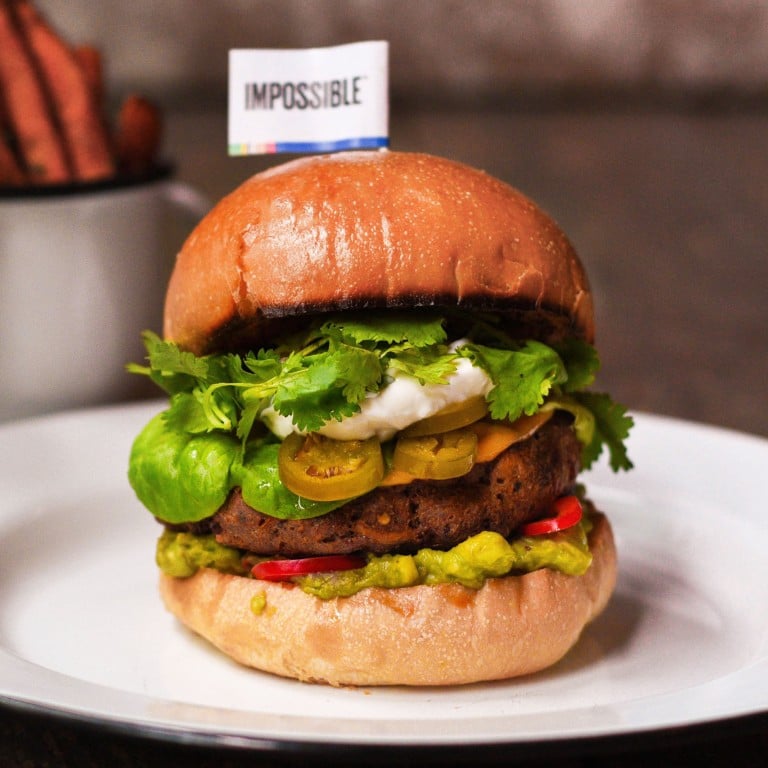
Vegan burgers vs meat burgers: what’s healthier? Plant-based patties have more fibre, less cholesterol, dietitian says, but more sodium
- Plant-based burgers like those from Beyond Meat and Impossible Foods have some benefits, says one dietitian, after analysing nine patties
- High red meat consumption is associated with a higher risk of developing chronic illnesses such as colorectal, pancreatic and prostate cancer
Anthony Wan Yuec Ho attempted to give up eating meat but failed. He said he is “weak-minded”.
“It [is] literally because there isn’t enough choice for vegetarianism,” the 36-year-old Hong Kong-based civil engineer said. Mushroom-based burgers and “bland” Buddhist vegetarian fare simply didn’t satisfy his appetite for meat, he explained.
He eats these new meat substitutes about twice a month and feels he is not compromising on taste thanks to such items. “The Beyond burger tastes nice. The Impossible [burger] … tastes like meat but it lacks the texture,” he said.

The trend towards plant-based substitutes has piqued Wan’s interest in lab-cultured meat, where the meat is “grown” from animal cells, from companies including Just, Memphis Meat and Mosa Meat.
“It’s not out yet, but they did a double blind test with some professional chef and they couldn’t tell the difference … I haven’t tried it but really want to.”
Five tricks companies use to make you think food is healthy
Trendy faux meats are all the rage, including in Hong Kong. US-based Impossible Foods, which offers its product in more than 10,000 restaurants in the United States, had its first international launch in Hong Kong, one of the largest per capita meat-consuming markets in Asia, last year.
The launch aims to tackle the global increase in demand for meat, said Nick Halla, senior vice-president international for Impossible Foods, at a conference in Hong Kong.
“Asia is where 44 per cent of [meat globally] is consumed today and growing quickly,” he said. “We have to get there really soon and grow very quickly to address that demand.” Halla says a few hundred outlets in Asia now offers its products.

“Looks, cooks and satisfies like beef without GMOs, soy or gluten,” is the marketing message behind the Beyond Meat burger. Impossible Foods says its burger is “made from plants for people who love ground beef – with the same flavour, aroma and nutrition you know and love”. Right Treat claims its Omnipork “is the first plant-based ‘pork’ that bleeds and tastes like ground pork in Asia”, adding it is “nutritionally superior and environmentally friendly”.
As these meat substitutes become increasingly available, experts are taking a close look at their nutritional make-up to see how they stack up against the “real” deal – which has been shown to be less than ideal.
For vegetarian items you are always concerned about the sodium
Research shows eating red meat can affect a person’s brain functioning, too. The Singapore Chinese Health Study published in June this year in the European Journal of Nutrition found a link between high red meat consumption and cognitive decline in later life.
The study gauged the dietary habits of nearly 17,000 people through a questionnaire. The subjects were visited three times, including a final follow up 20 years later. It concluded that “a higher intake of red meat in midlife was associated with increased likelihood of cognitive impairment in later life”.
Wong Chi-wing, director of food and dietetics at Hong Kong Adventist Hospital, did a nutritional analysis of nine different patty brands, both plant-based and meat-based, each of which weighed about four ounces (about 110g) and contained about 250 calories.
Wong, a vegetarian, discovered that the plant-based patties were mostly quite similar in nutritional make-up to their meaty counterparts. However, the plant-based burgers had two clear benefits in terms of cholesterol and fibre content.

The plant-based burgers were cholesterol-free (versus 71mg per 100g in a beef patty from US retailer Wal-Mart) and contained about 2g of fibre (versus zero in traditional burgers).
The fat levels were similar – 17g in a meat patty from US retailer Wal-Mart, versus around 18g in the meat-free versions such as Beyond Meat’s.
Wong’s chief concern was the substitute meats’ sodium content.
“For vegetarian items you are always concerned about the sodium,” he said, adding that the plant-based patties contained about 345mg on average versus only 66mg in the Wal-Mart beef patty.
Wong said it is recommended that the daily intake of sodium should not exceed 2,000mg.

Besides the differences in cholesterol and fibre, Wong declined to say if the substitute meats are healthier than real burgers. He said only that they are an “alternative” with some benefits.
Plant-based burgers may be free of cholesterol, but eating them doesn’t lower cholesterol levels, Wong cautioned. To do that, eat fresh or wholesome high-fibre fare – consider bean- or vegetable-based burgers, with patties crafted from wholesome ingredients such as pulses, seeds and oatmeal, he suggested.
Wong urged consumers not to instinctively equate vegetarian food with healthy fare. “Let’s take French fries, which are deep-fried. It’s vegetarian – but not healthy.”
Those suffering from high blood pressure or cardiovascular concerns should be watchful of sodium and cholesterol intake, cut down on red meat to reduce heart-disease risk, and consider cholesterol-lowering high-fibre foods instead, Wong advised.
People will not make a drastic change unless they need to for health reasons
Uwe Opocensky, executive chef of Island Shangri-La Hong Kong, was formerly group executive chef at The Greater China Restaurant Company that operates the Beef and Liberty burger restaurants. He shares Wong’s view.
Wholesome vegetarian burgers are on the menu, too, but they mostly cater to its meat-free clientele. Falafel burgers and a beetroot version are all made from scratch, from wholesome ingredients, but few consumers choose those dishes, Opocensky said.
Impossible burgers are sought after by diners who can’t live without meat, who consider this alternative as a step towards eating plant-based food, Opocensky explained. In doing so, “they don’t miss out on the taste of meat, but still eat vegetables and do something good for the planet,” he said.
But ever the realist, Opocensky added: “People will not make a drastic change unless they need to for health reasons.”

